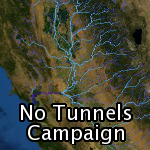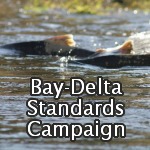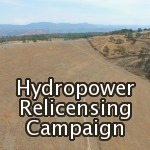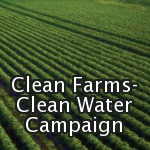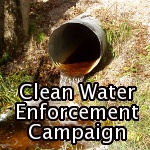CSPA Needs Your Help to Improve Fisheries and Water Quality
The existing regulatory waiver covering discharges from irrigated lands expires in June 2011, and the Central Valley Regional Water Quality Control Board will consider a new long-term program at a hearing on April 7. The Clean Farms – Clean Water campaign is attempting to gather together fishermen, environmentalists, concerned citizens and others who support abundant fisheries and clean water to urge the Regional Board to establish an effective program that will ensure that pollutant discharges from irrigated agriculture are reduced and minimized.
Runoff from irrigated agriculture is identified as the largest source of pollution to Central Valley waterways and the Delta. Monitoring downstream of agricultural areas reveals that virtually all sites exceed water quality standards and almost two thirds are toxic to aquatic life. Pollution is identified as one of the principle causes of the collapse of Central Valley fisheries. Agricultural pollution also threatens drinking water supplies and public health and is a major source of groundwater impairment. Inexplicably, irrigated agriculture remains exempt from routine requirements to protect water quality that have long been applicable to virtually every other segment of society.
The Regional Board is proposing a Framework, which will be followed-up over the next year with specific orders. Unfortunately, they propose to continue the same basic approach to regulating agriculture that has proved to be a dismal failure: i.e., ceding implementation of the program to industry advocacy groups. Under this scheme, the Board doesn’t know who is discharging, what pollutants are being discharged, the localized impacts to receiving waters and whether dischargers are implementing measures to reduce or eliminate pollution or if those measures are working. Consequently, the Board cannot identify any improvement in water quality or any effort to stop pollution.
More information, including CSPA’s formal comments on the proposed Framework and PEIR can be found at the Clean Farms – Clean Water button at http://calsport.org
Regional Board’s ILRP Framework website: http://www.waterboards.ca.gov/centralvalley/water_issues/irrigated_lands/long_term_program_development
CSPA Recommended Alternative:
In order to fully protect and restore degraded surface and ground water, the Regional Board should make the following changes to the proposed program.
- Eliminate third party coalitions and require instead that individual dischargers submit reports to the Regional Board identifying the location and content of discharges to both surface water and groundwater.
- Monitor discharges to surface water and groundwater and the effectiveness of measures implemented to reduce pollution. The blunt fact is that water quality cannot be protected if you don’t measure actual discharges to quantify pollution and evaluate the effectiveness of implemented management measures.
- Require all farm dischargers to prepare individual farm water quality management plans that identify measures implemented to reduce pollution. These plans must be made available to the Regional Board and the public.
- Require compliance with water quality standards in the near-term, not some uncertain distant future. After decades of no regulation and seven years of voluntary compliance, its time for an effective program.
- Demonstrate consistency with the state’s non-point source and antidegradation policies.
WE ASK YOU TO DO THREE THINGS:
1. Circulate this information to other interested individuals and organizations.
2. Submit comments to the Regional Board urging them to reject the proposed Irrigated Lands Regulatory Program Framework.
Comments on the recommended ILRP Framework can be sent electronically to Adam Laputz (AWLaputz@waterboards.ca.gov ) or mailed to the Regional Water Quality Control Board, Central Valley Region, 11020 Sun Center Drive, #200, Rancho Cordova, CA 95670; ATTN: Adam Laputz. Phone: (916) 464-4848; Fax: (916) 464-4645
3. Plan to attend the public hearing.
Date: 7 April 2011
Time: 8:30 AM
Place: Central Valley Water Board office
11020 Sun Center Drive, Suite 200
Rancho Cordova, CA 95670
The Regional Board will hold 3 sequential hearings on the following:
- The Proposed Framework
- Adoption of the PEIR
- Continuation for the Ag Waiver for 3 Years
It is important that the Regional Board understand that agricultural special interests do not represent the entire Central Valley community. Make your voice heard.



